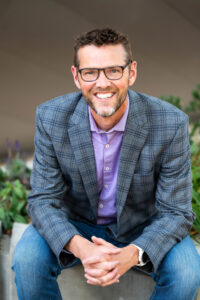I’m a cagey veteran of the staff here at Denver Institute for Faith & Work… a ripe 21 days into my tenure.
After serving on DIFW’s Church Advisory Council for the past two-and-a-half years, I transitioned from the faculty of Denver Seminary to a new role here as the director of cultural engagement. Amidst the myriad blessings of supporting this organization, the most personal one is that I get to vocationally love and serve the misguided, 26-year old version of myself.
There are some things about the Christian life that we are taught formally, and others that are caught indirectly.
In educational circles, we call this Formal Curriculum and Hidden Curriculum respectively, which are concepts John Ortberg popularized by applying them to our experiences in church.
I grew up in a church that taught the importance of personal holiness and knowing the Bible well. I was told from an early age that God cared deeply about certain practices that were key for our “spiritual life” — reading the Scriptures, prayer, and accountability to overcome areas of sin in my life.
But I also caught some unspoken things. On Sundays, I heard pastors talk about their “calling” to the ministry. I watched as we prayed for missionaries, commissioning them to do the work of the Lord. But I only ever heard pastors and missionaries being called by God, and I never saw us commission our teachers each fall before the school year began. So I caught early on that pastoral and missionary work and ministry were the most celebrated and sacred things God could ask one to do.
Fast forward to my mid-20s. I graduated with my Masters in Exercise Physiology from the University of Texas and was doing some important heart research — work that would affect the way we provide cardiovascular medical care to underserved black and Latino populations. At the same time, I volunteered at my church — preaching, leading mission trips, and discipling leaders in the college group.
But nobody at my church thought to care about my heart research. Meanwhile, they applauded my church ministry.
From these types of formative experiences, I became something of a dualist — I believed that there was a massive divide in the universe, separating the sacred from the secular. Practically, this meant that certain people who did certain types of “spiritual” activities were more important to God.
I wish 26-year-old me had a pastor say that in Christ, God is redeeming all things (Colossians 1) and that he cares deeply about me joining him on mission — his mission to see human flourishing through informed cardiovascular medicine. I wish I had a relational network of Kingdom-minded peers serving God and others in the public sphere… architects, venture capitalists, mothers, and electricians who sense God’s call upon their lives to work as worship and service.
I can’t go back in time, and I would never wish away my 17 wonderful career years as a pastor and professor. But I’d also love to mentor 26-year-old me as a budding scientist and support his pastor in leading their church toward an integrated, whole-life spirituality that pays attention to the faithful and formative work that the congregation is doing.
So my prayer for our work at DIFW today is that others would have those kinds of opportunities that I wish I had. And I’m thankful to be on mission supporting that piece of “thy Kingdom come, thy will be done.”

